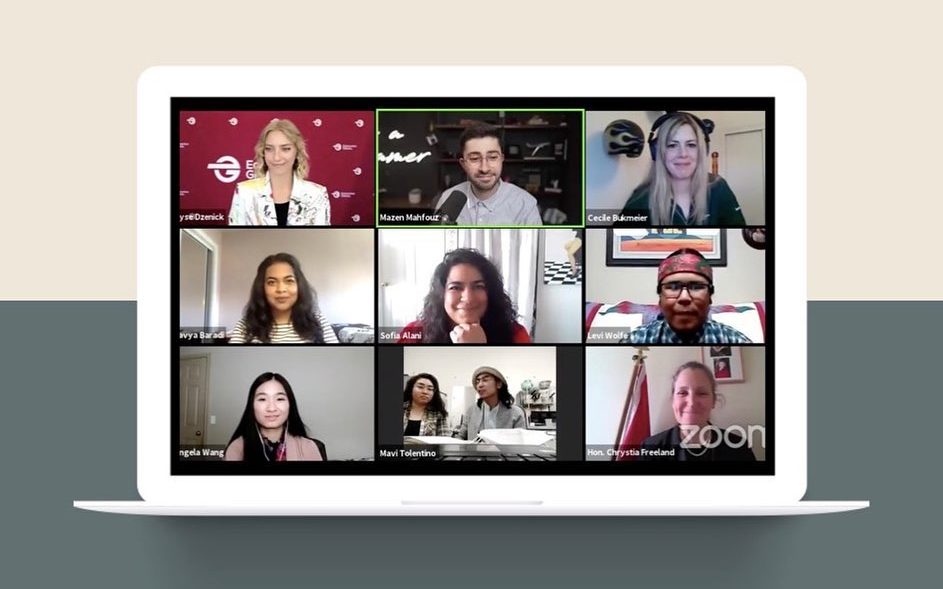Deputy Prime Minister Freeland discusses COVID-19’s impact with Edmonton youth
A diverse crowd of young panelists brought forth personal experiences with COVID-19 to the Deputy Prime Minister.
 Supplied
SuppliedChrystia Freeland, Canadian Deputy Prime Minister, virtually connected with young Edmontonians to discuss the influence of COVID-19 on adolescents.
The virtual panel, held on June 18, was moderated by Sofia Alani. The discussion featured a diverse set of panelists from Edmonton’s youth community. Freeland mentioned measures taken by the Federal Government to combat inequalities faced by young Canadians after each panelist explained how COVID-19 has impacted their livelihoods.
Freeland began opening remarks by describing herself as conscious of the extent to which young Canadians have borne a disproportionate burden tackling COVID-19.
“You guys have been locked up at a time in your life when you need to be out there with other people,” Freeland said. “You have been launching your adult lives in the greatest recession since the Great Depression. I am aware of the sacrifice [Canadian youth] have made for the rest of us… so I really want to say, thank you very much.”
Freeland said ensuring young Canadians are provided with governmental support was a main priority for the 2021 budget.
“There’s a lot of economic evidence that suggests if you come of age and graduate during a recession, you can face a lifelong impact … so when we were building the budget I said to my team, this is not going to happen to this generation of young Canadians,” Freeland said.
Instructor from NAIT questions job security for students pursuing careers in the skilled trades
The first panelist, Cecile Bukmeier, is an autobody repair instructor at The Northern Alberta Institute of Technology (NAIT). She began by describing the increasing anxiety faced by students with COVID-19’s impact on job security.
“It’s concerning that even though their job positions may be deemed essential, many were still laid off and left them feeling like they could not move forward with their career, or if they did, [moving forward] was no benefit to them,” Bukmeier said.
Bukmeier asked Freeland what resources and initiatives the government is providing to support youth after they finish post-secondary.
Freeland said the government is creating conditions that make getting an education easy, while ensuring that post-secondary education leads to jobs in the future.
“Part of the answer is being sure that student loans are not a burden on building your life,” Freeland said. “That is why one of the things I personally pushed for in the budget is you don’t have to pay your student loans off until you are making $40,000 at least, and the cap at repayment is 10 per cent of your income.”
Content creator asks how youth can increase engagement with their communities post-pandemic
Mazen Mahfouz, a Lebanese-Canadian filmmaker, songwriter, and digital content creator, asked Freeland about adapting Edmonton youth to life after COVID-19.
“The pandemic is normalizing isolation and social media consumption among the youth,” Mahfouz said. “How can we not only encourage our youth to get out and participate in our communities post-pandemic, but also inform them of local initiatives going on?”
In response, Freeland encouraged prioritizing community and connecting while the country reopens.
“You are a big part of the answer,” Freeland said. “Culture and community events are going to bring us together this summer.”
Freeland added that she is a “big believer” in being careful about reopening.
“We’ve come too far and sacrificed too much to blow it,” she said. “With that, I believe this needs to be the summer Canadians break out of their hibernation and hang out with each other.”
Member of Alberta Native Friendship Centre inquires about the government plan to support urban Indigenous communities
Levi Wolfe, a member of Alberta Native Friendship Centre, highlighted COVID-19’s impact on urban Indigenous youth face.
“Barriers have only been heightened [for urban Indigenous youth] by the COVID-19 pandemic,” Wolfe said. “My vision for a post-pandemic country is one where urban Indigenous youth are healthy, thriving, and fully engaged by the government with decision-making processes.”
Wolfe proceeded to inquire about the government’s plan to uphold Call to Action 66 in the Truth and Reconciliation Commission’s Calls to Action. This calls upon the federal government to establish multi-year funding for community-based youth organizations to deliver programs on reconciliation. It also promps the govermnent to establish a national network to share information and best practices.
“How will the government implement the Truth and Reconciliation Commission’s Calls to Action 66 to meaningfully engage and support Indigenous organizations and youth to lead reconciliation on a grassroots level?” Wolfe asked.
Freeland mentioned the 215 children whose remains were reported at the former Kamloops Indian Residential School as a reminder of the work that needs to be done for reconciliation in Canada.
“I am hopeful that as a country, we are so different from how we were when I was growing up,” Freeland said. “I really believe, and this is especially true among young Canadians, that we have understood that an essential project for the whole country is the work of reconciliation.”
Freeland concluded by stating the budget invests $18 billion in supporting Indigenous communities in Canada over the next five years. She also recognized progress that still needs to be made.
“We have done significant work up to this budget… but there is more to be done,” Freeland said.
Freeland asked by U of A business student how the government can ensure intersectionality during economic recovery
Navya Baradi drew attention to the financial and economic inequalities faced by women within Canada. According to Baradi, 80 per cent of young women were working in hospitality and retail. She described these as the “first sectors to close” and “the last ones to start opening up.”
“Young women face greater barriers for the same financial opportunities as other demographics,” Baradi said. “Considering this reality, how can we ensure an intersectional and multifaceted approach to economic recovery?”
Freeland expressed her support for the points brought up by Baradi.
“Every single point you make is right and important,” Freeland said. “We can ensure an intersectional approach by taking an intersectional approach.”
Freeland claimed the budget is geared towards those hit hardest by the pandemic.
“The economic impact made by COVID-19 has been entirely uneven,” Freeland said. “The hardest hit groups are youth, women, low wage workers — particularly racialized and Indigenous. That’s where the wounds are, and that’s where the healing needs to be. That’s why this budget is very much directed at providing support there.”
Co-owners of newly-opened coffee shop expressed financial difficulties and struggles due to COVID-19
Mavi Tolentino and Reika Herradura, who own local Intent Coffee, highlighted COVID-19’s impact on small businesses. They expressed one struggle faced is ineligibility to government-provided funding.
“As a newly opened business, we are not eligible for any of the federal COVID-19 financial aid… we’ve been financially struggling to sustain the advancement of our vision for months now, and we’re at the brink of closing down actually,” Tolentino said. “Our question [to you] is, what will the government do to fill in these gaps?”
To this Freeland responded with words of encouragement. According to her, Canadians drastically reduced spending during the COVID-19 pandemic. Freeland said this will prompt Canadians to increase spending as the nation opens up.
“I can only imagine how hard it has been to do this after COVID-19 started,” Freeland replied. “[That is] very brave — well done for surviving. I want you guys to feel very optimistic right now… there is a very strong conviction that we are going to have an economy that comes roaring back over the summer.”
Freeland also listed the federal government’s Women Entrepreneurship Strategy as a potential support for women entrepreneurs, and the Canada Digital Adoption Program which will “provide micro-grants and advisors to help [business owners] adopt new technologies to make yourselves more productive.”
U of A electrical engineering student questions Freeland on the ways scientific innovation will be supported by the federal government
Angela Wang described the COVID-19 pandemic as highlighting how science, technology, engineering, and mathematics (STEM) can solve real world problems.
“We noticed science and innovation played a significant role when it comes to solving problems that are faced not only by Canadians but globally,” Wang described. “As we move towards a post-pandemic world… how will the government support and encourage the pursuit of STEM innovation, especially in young people and for underrepresented groups?”
Freeland agreed with Wang, emphasizing the importance of funding education and post-secondary institutions.
“I agree with your thesis,” Freeland said. “Canadian science and Canadian innovation is our future. We need to fund education… and we need to fund our universities as well. You guys in Edmonton are so lucky to be in a city that has the U of A. It is an outstanding university that does amazing work.”





